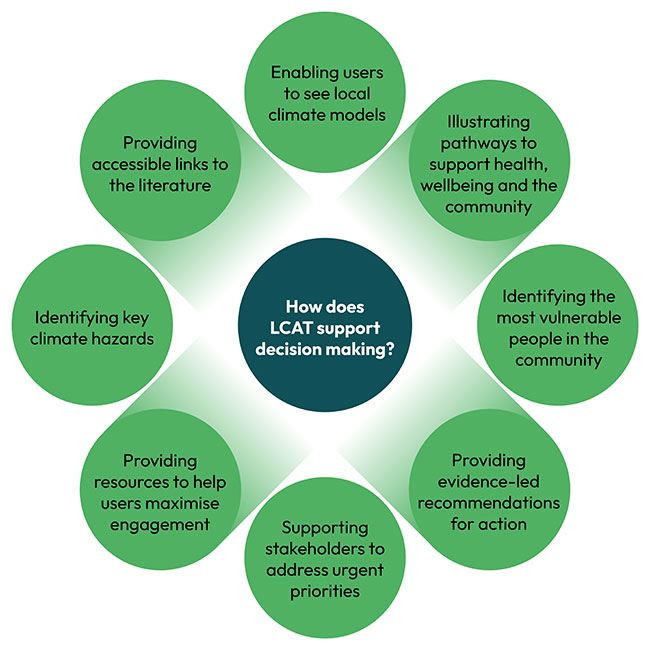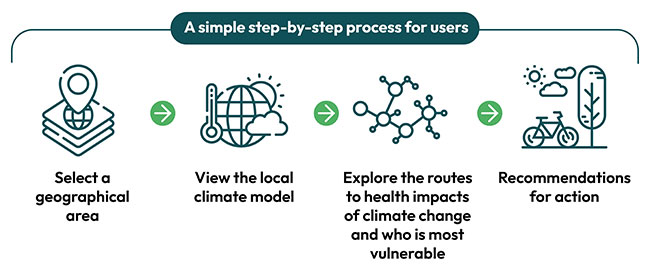The Local Climate Adaptation Tool (LCAT) is a national evidence-based resource to support local decision-makers, including public sector institutions to take climate adaptation action.
Summary
The Local Climate Adaptation Tool (LCAT) is a national evidence-based resource to support local decision-makers, including public sector institutions to take climate adaptation action. The tool has been co-designed with over 50 local authority areas and provides data and evidence to help local areas understand the current and future climate, likely risks and impacts and adaptations needed. As well as highlighting impacts across sectors, it uses health as a lens to highlight the health impacts on communities. LCAT is a project between the University of Exeter and Cornwall Council, currently funded by Horizon Europe BlueAdapt project.
The challenge
The need to adapt to climate change is urgent and local decision makers are at the front line in this. However, many lack the information, time, and access to evidence to plan for future climate scenarios.
Adapting to climate change is essential for all sectors as the impacts of climate change will impact everyone. Climate change will affect the health and wellbeing of local populations in direct and indirect ways. All services and sectors need to consider how to adapt to reduce this impact.
However, the ability of local authorities to understand and act on the risks is limited. Stakeholders report that a lack of capacity, time, funding and usable tools and resources is a major barrier. Furthermore, they report that decision making within local authorities can be focused on short term outcomes and siloed within services, potentially leading to oversimplified approaches. To date, the major focus has been on mitigation (carbon reduction) rather than adaptation, which remains a largely unexplored yet vital policy driver as the scale of climate change effects becomes more apparent.
To avoid maladaptation and significant unintended consequences, best practice suggests that mitigation and adaptation need to be planned together; a multi-agency approach leads to better planning and outcomes and long-term planning is necessary.
The solution
LCAT is an online tool that supports decision-makers at a local level to take evidence-informed climate action. Designed with, and created for, local UK decision-makers. It provides information on:
- How local climates will change?
- What the likely hazards are (e.g flooding/ wildfires)
- What health and community impacts may occur as a result?
- Who will be most vulnerable and why?
- Which adaptations to consider?
It has been created through:
- Co-design with stakeholders from across the UK, including multiple local authorities.
- Accessing data from open-source repositories to ensure LCAT remains free.
- Presenting data in accessible formats to ensure stakeholders can understand and use the information easily.
- Undertaking evidence reviews, beginning with the UK Climate Change Risk Assessment and the IPCC 2023 reports, followed by additional literature searches focusing on health and wellbeing impacts for LCAT.
- Identifying case studies to offer examples of action taken by local organisations.
- Developing the mDPSEEA framework and causal loop diagrams to show the evidence of climate change impacts on health and its complexity.
As such, LCAT works to overcome many of the barriers stopping adaptation action by providing a free, easy to use tool which brings together trusted sources and evidence in one place. LCAT supports short, medium, and long-term thinking and multi-agency working and provides accompanying advice and guidance on what best practice looks like.
Furthermore, the use of a health lens provides a common ‘language’, relevant to all service areas, and facilitates a multi-agency approach to adaptation planning. Key to its success is the involvement of Cornwall Council as a partner and many local authority staff from across the UK. The co-design approach has ensured the tool is relevant to the existing policy context and governance processes and the needs of decision-makers.
The impact
The tool aims to:
- Increase people’s understanding of climate impacts and solutions.
- Support the adaptation planning process at a local level.
- Support a multi-agency approach.
- Ensure health and vulnerability are core parts of adaptation planning.
How is the new approach being sustained?
In terms of funding, the project is currently co-funded to 2026 through BlueAdapt.
BlueAdapt has received funding from the European Union’s Horizon Europe research and innovation programme.
Over the coming two years the project plans to update and develop LCAT further and run an evaluation. Updates include the development of downloadable data/ reports, bringing more data into the tool to provide more localised outputs, highlighting co-benefits, and enhancing the case study offer.
In terms of the relationship between Cornwall Council and the University of Exeter, this partnership continues. Both parties are committed to the long-term nature of this project, and others like it. The partnership has been further formalised by the Civic Universities Agreement, recognising the role of both anchor institutions in Cornish society.
Cornwall Council officers will continue to feed into the project development, to ensure that the tool is relevant and valuable to the evolving decision-making processes within local authorities. Furthermore, the LCAT stakeholder group will also continue to co-design the tool in the future.
Lessons learned
- Short-term funding can hamper decision making and limit the capacity of local authorities to develop adaptation focused work. A long-term focus is important for adaptation work, and this can run counter to existing timelines.
- Stakeholders are concerned about equality and justice. They want advice and data that supports a fair approach and one that considers who is most vulnerable to a changing climate.
- Stakeholders want different options for how the data and evidence are presented, with options for top-line findings as well as the details. Broadly, these could be categorised as ‘officer level’ information (those who would be responsible for understanding the detail) and ‘decision-makers’ (those in typically high-level roles who need only the top-line overview to make final decisions). It is therefore important to present data in accessible variable formats to reflect where the users are in their journey to understand and act. Stakeholders want and need multiple datasets in one place, aggregated by differing geographies so they can make the best decisions and fully understand risk and impact.
- More broadly, the project has emphasised the importance of taking a co-design approach and making the right connection at the right time and in the right way, when developing collaborations between universities and local authorities. The LGA Net Zero Innovation Programme project initially enabled this to happen and a prototype to be created which then enabled the project to attract further funding and further developments.
Contact
University of Exeter: [email protected]


